The 36 Deadly Styles, The 7 Grandmasters, The Old Master, The World of Drunken Master (1978, 1979)
Directed by: Joseph Kuo
Written by: Joseph Kuo, On Szeto, Raymond To, Shan-Hsi Ting, Yao Ching Kang
Starring: Bill Louie, Hwang Jang-lee, Jeanie Chang, Lee Yi Min, Lik Cheung, Mark Long, Yu Jim Yuen
CINEMATIC VENGEANCE [1974-79] – 8 KUNG FU CLASSICS FROM DIRECTOR JOSEPH KUO [Limited Edition Box Set, 2000 copies]: On Blu-ray now, from EUREKA ENTERTAINMENT
Though his name is not the most familiar, the Taiwanese Joseph Kuo produced, directed and wrote many martial arts movies during the genre’s classic period. Join me in the world of secret martial arts manuals containing rare techniques, kung fu schools battling for supremacy, revenge for the death of a master or a parent, and – last but not least – lots of “but still“s in the English dialogue.
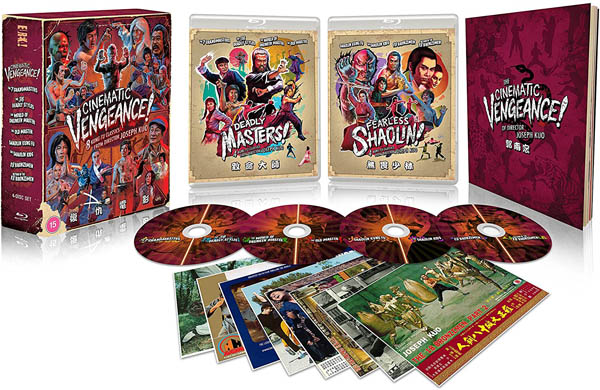
DISC ONE
THE 7 GRANDMASTERS [1979]
AKA HYU BAO LONG SHE YING
RUNNING TIME: 84 mins
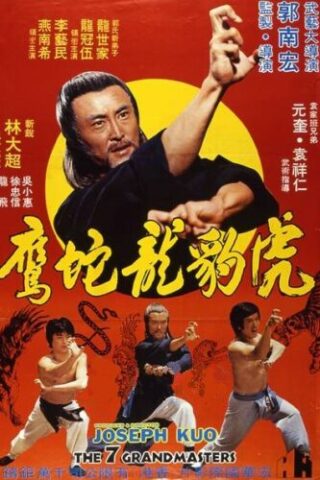
Master Seungkwan Ching is getting ready to retire from martial arts when he receives a note alleging that he’s not the best unless he bests all the other masters. So, accompanied by three students, he sets out to find and fight each of the Seven Grandmasters to prove his superiority. Two of the victories are witnessed by a young man named Siu Ying who wants desperately to train under Ching and learn the Bak Mei Strikes so he can avenge his father’s death. However, Ching has no interest in teaching him and the others keep trying to put Sui Yung off, even using violence, but he will not stop following them. Ching’s reluctance to share his knowledge could be because of an incident 30 years before, when he himself was a student. His master chose him to inherit the secret Bak Mei book, but somebody poisoned his master, then stole several pages, leaving only nine strikes left….
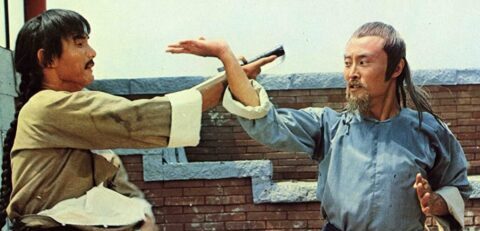
Structured as a series of fairly diverse fight sequences but also containing a decent plot that has most of the ingredients that we’ve come to expect and love yet which also has at least one surprise in it, The 7 Grandmasters is certainly a good example of its kind and starts off this set well. It has a slightly more rough and ready vibe and feel than your average Shaw Brothers and Golden Harvest productions, with minimal use of sets and more variety of angles during the action, though its seeming contradiction in its approach to the Taiwan locations is rather amusing, with us every now and again getting a glorious countryside shot which is then cut short, as if Kuo kept saying to the cinematographer “Now now, that’s enough of that”, either because there wasn’t enough time in the shooting schedule for such malarkey, or he didn’t want such shots to slow down the pace and give audiences an extra few seconds to wait until the next fight scene. Fortunately this is an early choreography job by Corey Yuen so the fights are pretty smooth, while the majority of the performers are obviously highly skilled, so much so that we don’t really need daft moments such as, for example, somebody being engaged in a duel and then suddenly leaping up towards a tree, bouncing off the tree and landing on his opponent’s shoulders. The most oft-used technique that’s a little unusual is the art of sliding across the ground lying down towards an opponent before kicking them. Obviously one of the Twelve Bak Mei Strikes then. I couldn’t work out what most of the others were, but then I was enjoying as much dialogue like, “Think I’m better”? “That’s why I’ve come here to check on that”. Of course I had the English dub on most of the time; if you’ve been reading me for some time you’ll know that I’m one of those heathens who prefers to watch these films in English. You’re hardly ever hearing the actor’s real voices in the Mandarin or Cantonese versions anyway.
So our young master wants to retire despite his age for reasons we never find out, but his plan is interrupted so he feels he has to go traipsing all over China to fight these Seven Grandmasters, and fight them he does really quickly; we’re later told that most of the film’s action takes place over two years, but we don’t at all get a sense of this. Anyway, the first two duels are won quite fast, but the third is a lot harder, the opponent being a master of Monkey Kung Fu, so as well as moving like a monkey makes he makes the sounds of one as well. But then we’re now in a world where every punch and kick, even every move even if it doesn’t connect with an opponent, makes a sound. I especially love the noise that we hear whenever people jump into the air; it’s like flags being blown by the wind. I’m not trying to sound nasty by the way; I really like these films and their idiosyncratic conventions. Ching does eventually manage to best this third opponent, but he’s being watched. The watcher is Siu Ying who, except for an encounter with his distraught mother and an old man who says he can introduce him to another teacher and who clearly knows more than he’s letting on, basically stalks Ching for over half the film. You’ve got to admire his determination. When he can’t get on the boat that the others are using to cross a river, he just swims across. He spends a night out in the pouring rain while everyone else stays at an inn. The other students taunt him and even beat him up. But Sui Yung keeps on coming, and even brings a doctor [who’s still asleep in a nice comedy moment] when Ching falls ill. Eventually Ching does give in, and we get some of the usual training goodness and something – the kicking of vases hanging on strings while the trainee is doing handstands – I hadn’t seen before, as the plot thickens. For reasons I won’t reveal, student ends up having to fight master, and we genuinely feel the emotions of both about this.
There’s plenty of mixing of martial arts techniques on display and even a cracking weapons duel involving Yuen himself where the combatants go through a variety of traditional weapons including sies, hooks and a spear. Star Li Yee Min has a nice fresh faced charisma and handles his character’s emotional journey reasonably well as well as pulling off some lighter moments which are mostly around a third of the way through, such as a very well staged bit where he’s trying to get some medicine he’s got for Ching off one of his students without spilling it, while comedy music plays and plays in the background. Sui Yung’s later fights are augmented by quick flashbacks to people performing the skills he’s just mastered. It seems like there’s going to be some romance between Sui Lung and Chung’s daughter, but apart from a few private chats which are cut to the bone, nothing seems to result. Talking of the score, it seems to be full of tracks taken from other films – the one during the climax is a cracking, rousing piece – though I only recognised Quincy Jones’s theme from the TV series Roots, some bits from John Barry’s The Deep and one tiny portion from Marvin Hamlisch’s The Spy Who Loved Me. With far fewer deaths than normal and one of Ching’s rules being to never kill someone if you can help it, The 7 Grandmasters has a slight moral aspect which is pleasing [though of course I wouldn’t want to see it in every film], yet still totally delivers.
Rating: 









SPECIAL FEATURES
Original Mandarin audio track
Alternate Cantonese audio track
Optional English dubbed audio track
Brand new audio commentary with Asian film expert Frank Djeng and martial artist / filmmaker Michael Worth
Each of the films in this set gets a commentary. Djeng does four, two with Worth and two with John Charles, while Mike Leeder and Arne Venema do four together. Loads of talk track goodness then, and the one here is a good start, though Djeng says it’s the last of the ones he did, saving the best till last, which means that we get a few references to The World Of Drunken Boxing which is on Disc Two. Djeng dominates at first, but Worth gradually talks more and more in a both enthusiastic and fact filled chat. Obviously there isn’t a huge amount of information about the film in question, but fans will still find most everything they say to be of interest. Apparently I should prepare for more convoluted plots featuring very long gestating plans as that’s a favourite Kuo thing, while the two wonder why none of Kuo’s leadiong actors broke out into stardom despite their obvious skills. We learn that the second grandmaster is Angela Mao’s brother, while Djeng thinks that the woman by the river is Sui Yung’s wife or sister rather than his mother. Apparently they tried but failed to get an interview with Kuo for this set.
THE 36 DEADLY STYLES 1982]
AKA MI QUAN SAH SHI LIU ZHAO
RUNNING TIME: 92 mins
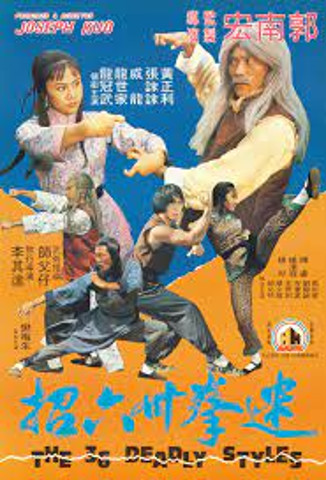
Wah-jee and his uncle are fighting ruthless fighters led by Mien Tsu-mu but eventually see more sense in fleeing. They seek refuge in a temple where a monk named Huang saves the day, though the uncle dies of his wounds. Wah-jee is then put to work in the temple, but dislikes it there, finding it tiring and menial, though he makes friends with soya milk seller Tsui-jee which helps a little. However, Tsu-mu is still around and calls two of his brothers to help find and kill Wah-jee and Huang, while Wah-jee learns that his father died at the hands of one of these very brothers. Meanwhile his third brother is killing trher martial arts masters as some form of revenge mission, while at the time another villain heads off to a Tibetan temple to seek out a master named Kaung Wu Chun who has the manual of the 36 Deadly Styles…
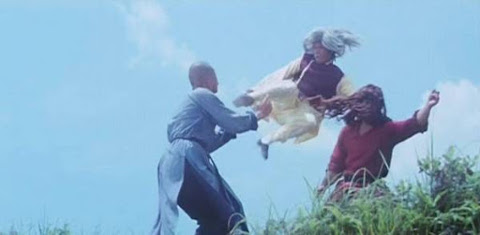
I must apologise for my synopsis of the first third being a bit incoherent, but that’s how this film is. You could probably place most of its scenes in a different order and it wouldn’t make any less sense. People wonder about and run into each other and fight, usually because of stuff in the past. It’s possible that this is all you need to be aware of, otherwise you may tire yourself out trying to connect everything. A good example is the subject of the title. Our hero has to master some unique techniques such as the Playing The Flute Under the Sky, not to mention the powerful Crippled Style, but we’re never told that these are the 36 styles. They could be, but some proof might have been nice. In fact they’re only mentioned once, and that’s in the subplot concerning the trip to Tibet by a white eyebrows guy to get the manual, which is only given a few scenes and could have been deleted from the film altogether. I did like the way this ironic subplot concluded, though many fans expecting a great duel will be let down. At least there’s plenty of action elsewhere, but until the final reel, anybody expecting it to be of the quality of The 7 Grandmasters needs to seriously readjust their expectations. Much of it is comic in a film which is clearly heavily influenced by Drunken Master, though the fighting is less fluid, while, despite Huang Jang Lee’s character being in the film throughout and frequently fighting, it’s patently obvious that it’s not actually Jang-Lee at all until towards the end when we finally get that incredible combination of power, precision and grace that made his footwork legendary. The whole thing feels thrown together.
A bewildering group of scenes begins the film after the rather psychedelic opening titles. Wah-jee and his uncle are battling these people, but then we also have the Tibet subplot being introduced, the Jang-lee double defeating an opponent, and Huang the monk in the temple skinning a snake [shown in detail] to make a potion for his heart. Well, I assume it’s for his heart – he sometimes seems to suffer from something but we’re never told what it is. There’s even a flashback to one of these scenes I’ve described before we focus more on Wah-jee and the temple where Wah-jee is made to work very hard indeed. Huang goes around having a go at and even hitting other monks for no apparent reason, while Wah-jee humiliates and beats up two other monks, in a skit that goes way beyond its rightful time and hardly makes Wah-jee particularly sympathetic. This means that we rather like it when pretty Tsui-jee holds her own against him when he’s unable to pay for the soya milk he’s been ordered to buy from her. Meanwhile Tsu-mu has played dead and now sends for his brothers to help. Bolo Yeung, sporting a bizarre wig that looks like it’s made of rope and gets in his way during fight scenes, and a similarly dressed guy is a blonde wig despite having a black beard and moustache, are soon marching around the town, getting into fights all over the place, as do many of the other characters, though it’s not easy to work out why. In The 7 Grandmasters, there was a good reason for every fight; here, it’s all a bit random, though of course eventually Wah-jee is injured and has to train, and this section is usually a highlight, but isn’t too great here. Most things probably come together, but I’m left with questions that I won’t type out because it’ll reveal too much. But if anybody reading this review knows this film and can tell me what’s going on, please reply.
Early fights tend to be a bit scrappy and sometimes rely on the flailing of arms, but several brawls in the inn where Tsui-jee and her father [another memorable appearance by Mei Sheng Fan, a really familiar face around this time in Hong Kong movies and an actor who could be both funny and subtle] come off okay due to good use of the setting. The end fight is one of those where it’s hard to believe that the hero can win, nor to we cheer him on. Lik Cheung was obviously asked to be like Jackie Chan, but is rather wooden and doesn’t even carry off particularly well the comedy scenes where all he really has to do is act in a silly manner; though a slapstick fight where a bowl of rice is transferred all over the place and isn’t spilt is a major highlight. At least Jeannie Chang, despite being given a horrid voice in the English dub, is given a fair few opportunities to show what she can do, though again the romance side is downplayed as to be barely there. Lau Chen as Tsu-mu seems to have been asked to behave as stupidly as possible with loads of mugging for the camera; the character never seems threatening even though he’s actually quite cunning, something that could have been played on to sinister effect. At one point he dresses up as a woman but doesn’t shave his moustache. But I did chuckle here and there so the feeling that little of this is being taken seriously didn’t bother me after a while. Again, there’s good use of music, if probably mostly stolen; all I recognised was a snatch of the Pink Panther theme and a comical cue from the original 1964 The Pink Panther. The 36 Deadly Styles is a total mess of a film, but I’d be lying if I said I didn’t enjoy it, and there’s certainly some good stuff in it.
Rating: 









SPECIAL FEATURES
Original Mandarin audio track
Optional English dubbed audio track
Brand New Audio Commentary with action cinema experts Mike Leeder and Arne Venema
The every lively pair of Leeder and Venema are truly on form with this track, enjoying the weird things in this movie while still loving it too. Is Leeder joking when he calls it “Joseph Kuo’s classic”? Venema close his eyes during the snake-skinning scene, while Leeder describes what the conditions are like of the hotel where visitors to the Shaolin Temple are like. One thing I like so much about their tracks is they often go off on tangents but almost always about amusing and/or interesting things, such as how many people in Chine become monks for just a short time because they’re bankrupt, or how he did a great interview with Jang-Lee for Hong Kong Legends who sat on it, then tried to license it out but sent it to the wrong address and it got lost forever.
DISC TWO
THE WORD OF DRUNKEN MASTER [1979]
AKA JIU XIAN SHI BE DIE
RUNNING TIME: 96 mins
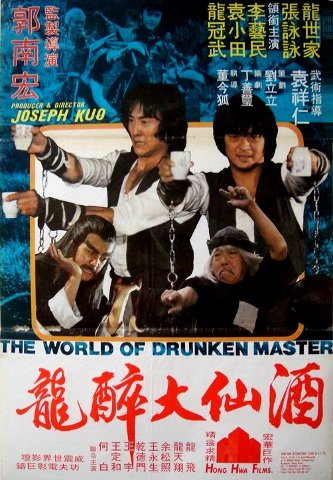
Fan Ta-pei is a martial arts master who’s just accepted his latest challenge. He also receives a letter telling him to go to an inn that’s nearby. There, he encounters and fights with another man until they both smell Sweet Premium Wine which they love, and then recognise each other. The other man is So, and he was Fan’s friend a great many years ago. As young men, they first meet when both are trying to sell stolen grapes, and then run into each other again when trying to steal more grapes from a field. They’re caught by the owner, martial arts master Li Chan, and put to work, but soon progress to learning martial arts from him. This comes in handy when local thugs terrorise the town for money, but their participation provokes the wrath of Mr Yeh, who owns the land and wants to drive out some of the peolel who live there. And then there’s the matter of Yu-Lu, the Sweet Premiun Wine fermenter whom they both take a shine to….
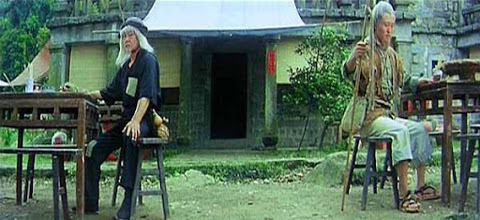
In Drunken Master, we see several times that the Drunken Style either requires you to or at least helps if you get plastered just before carrying it out, though in real life it just involves the person moving like a drunk person and being very unpredictable and fluid. This film sticks more to reality; characters do drink, but the only scene where somebody actually seems genuinely pissed has him not be as good as he normally is, and he didn’t even intend to fight in the first place but is lured into a trap, while in the climax our hero doesn’t have anything to drink at all. The title leads one to expect a film that’s even more inspired by the Jackie Chan megahit than The 36 Deadly Styles, especially seeing as the character of Beggar So also appears in it, but this isn’t really the case, and not just because there are two heroes learning the Drunken Style instead of one. In fact it’s the most serious out of the three films in this set so far. Of course there are comedy moments, in particular a really cool scene where Ta-pei and So practice martial arts in heir sleep and, because they all sleep in one large room, disturb all the others, but they’re almost entirely relegated to the first half of a story that gets rather tragic and concludes in a melancholic fashion which is not just unusual but suggests that fighting isn’t always the road to success – though this doesn’t stop it form delivering probably as many fights as The 7 Grandmasters. More carefully put together than the previous two movies, it contains a lot of nice foreshadowing, and benefits from a simpler though not always predictable story, this time cooked up by somebody other than Kuo, Shan-Hsi Ting, though it takes further Kuo’s interest in flashbacks.
It opens with none other than Simon Yuen, So in Drunken Master, walking along a beach, drinking, then doing some moves, while a voiceover tells us about the style and that we’re “About to hear one of the legendary stories of the fighting world”. Yuen disappears for the rest of the film. The Wong Fei Hung theme – a variation of which make up most of the rest of the music score – comes on for the credits, though it shouldn’t really be used should it, seeing as Wong isn’t actually in this film? Now we meet Fan, saying the name “Yu Lung” wwile remembering when he knelt in front of her with somebody else before being told by somebody that an associated of Tiger Yeh, who he killed, is after him. After encountering So, we flashback 30 years and see how they met. Both are impetuous youths who gets into trouble much like the characters Chan was playing at the time, and have a pretty good comic fight in the street, then become virtual prisoners of Li Chan. The two have to work really hard to repay their debt despite trying to cheat, and are reduced to fighting over a piece of bread. They’re easily defeated when Tiger Yeh’s gang comes along and throws its weightr around, but want to learn, and we get a surprisingly early training sequence, though the way that they gradually get better is nicely done and believable. Tiger’s father Mr Yeh is introduced surviving a murder attempt by people he’s starving; maybe that explains why thereafter he tends to have men with arrows or knives around just in case he starts to lose a fight. Things hot up more and more because Yeh wants more land and more money, even though the destruction and murder he orders doesn’t make much sense, and as our two heroes get more skilled they more want to help, though Chang prefers peace. Some familiar beats are used but it all becomes surprisingly downbeat.
The fighting is just about as good as in The 7 Grandmasters, and Kuo, as usual, makes some effort to vary the settings. Of course the Drunken moves , some of which are familiar and some of which aren’t, are great fun, especially when as a voice calls them out to us as they happen. Long, who get to fight his brother Mark in the climax, seems to be more skillful as well as a better actor than Siu-Tin Yuen who plays So as a young man – Li Yi Min plays his older self – but the two are a good pairing, whether as friends or foes. Kuo goes a bit mad with the rapid zooms in tis one, though where the film falls down a bit is with the romantic element, which needed to be given more time for it to work. I know that Kuo likes to keep such things to a minimum, but we don’t get a sense that both of the guys are in love with her until near the end, after the film’s one really poor scene when she runs into the forest in tear saying to them “You’re worse than animals” because they’re ignoring her. Therefore the romantic tragedy doesn’t quite come off in the way that it should despite the rather good performance of Jeannie Chang who was also in the previous film. Yet we’re still left with the notion that their immaturity, which could include their liking for fighting, has held them back in life. The movie’s nature doesn’t allow screenwriter Shan Hsi-Ching Ned to really go into the themes he’s looking at, but at least he attempts a bit of depth in this quite well structured and thought through effort. In fact I’d say that it’s a bona fide classic of the genre.
Rating: 









SPECIAL FEATURES
Original Mandarin audio track
Alternate Cantonese audio track
Optional English dubbed audio track
Brand new audio commentary with Asian film expert Frank Djeng and martial artist / filmmaker Michael Worth
Djeng and Worth return for a second track which is probably even better than their first. While they don’t regale us with as much information, they spend more time watching the film and commenting on scenes and aspects as they appear, therefore making kit feel like we’re watching the film with them, which is always nice. Djeng points out jokes that only Chinese people will get, like the translation of Premium Wine sounding like “penis”, tells us that one person voiced several characters and that Jackie Chan’s voice double did Siu-Tin Yuen, and recall visiting Central Picture Studios in Tai Pei where Kuo’s films almost always had their interiors. The two also tell us of their background in both martial arts and martial arts movies, while Djeng reveals his pet peeve – obvious undercranking [speeding up] of fight footage. I’m inclined to agree.
THE OLD MASTER [1979]
AKA SHI FU CHU MA
RUNNING TIME: 98 mins
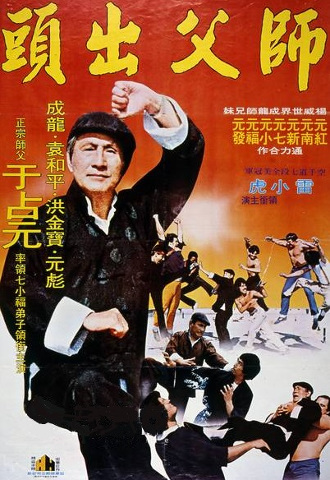
Mr Wang is the head of a Los Angeles martial arts school and owes the mob money because of his gambling depts. He calls upon his old friend from Hong Kong, the elderly Master Wan, to help out. Instead of sending his best student, Wan shows up himself and soon shows himself to be more than adept against thugs and challengers. Wang realises he can make lots of money and repay the mob if he gets people to bet against Wan because of his age, but Bill, one of his students, finds out about this….
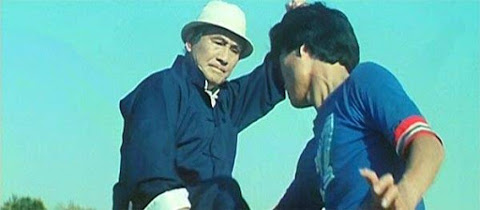
So far it seems like there’s pattern to this four-disc set. The first film on each disc will be good, and the second film won’t be. In a way this is admirable, Eureka not always picking Kuo’s best work but providing more of an overview of the most commercially successful period in his career, which of course should by rights include some bad as well as good. The Old Master isn’t as much of a mess as The 36 Styles, but it’s even more baffling. It was probably made when The Young Master was known to be in production, but there’s no way that Kuo could get Jackie Chan, so he decided upon what to him seemed like the next best thing; get the guy who trained him, Chan’s Peking Opera master Yu Jim Yuen. Unfortunately Yuen was 74 and was never much of a fighter, but, not to be thwarted, Kuo went ahead and used Yuen anyway, employing a double to play his character in every single fight scene even though this required him to be shot entirely from the back. Despite the use of a few closeups, it’s painfully obvious, and makes the ‘cheating’ in the use of Hwang Jang-Lee in The 36 Deadly Styles seem entirely forgivable, though this was in no way the only instance where this kind of thing was done [Game Of Death being the most famous], so I doubt that Kuo thought that he was doing anything bad. Set in the present day, it’s clearly inspired by Way Of The Dragon, while the English language version even dubs Bruce Lee’s cries onto the soundtrack when co-star Bill Louie is fighting, though these aren’t in the Mandarin or Cantonese dubs. As with the Lee film, the setting makes it silly that folk are speaking in Chinese, but in the English dub several comic scenes that make use of the language barrier just don’t work at all because everyone speaks English!
Hardly any of the characters seem to have names, so I’m not being lazy here. The head of this Los Angeles school is first seen in a mob boss’s office being threatened with violence if he doesn’t pay up within three weeks, though this plot element then disappears forever. This is followed by a very lengthy sequence of Wan being driven from the airport to a carpark, either to pad out the running time or to show off that some of this movie was actually shot in the United States. The taxi driver deliberately drops him off where three yobs are waiting, and we get the first of many ridiculous fights where we never buy it that this character is as nimble and skillful as all that, the doubling being so obvious. At the school, Wan is fooled for a while as he makes a name for himself with his martial arts mastery and gets increasingly large sums of money for his old pal, but there’s one really honest student living there – Billy, who doesn’t need to pay for is teaching because he has no money. He finds out what’s going on and tells Wan, but the latter takes place offscreen; surely this is an important scene so we ought to see i?. But then Yuen is not much of an actor at all so he may have not been be able to pull such a dramatic moment off. Bill wants Wan to teach him kung fu, but Wan understandably doesn’t want to do so because of how the school master turned out, so action takes a back seat for a while for humour, which mean things like Wan having a fat lady after him. However, Bill’s robot style, inspired by a toy he has, is clearly not enough, so Wan eventually relents and Billy is having to undergo tasks to having to place eggs in tiny baskets that are in a circle while doing handstands.
This time the action is mostly relegated to the first and final thirds ,the middle taken up with much padding, especially a lengthy sequence set in a disco where the dancing fails to match the beat of the music which includes a disco version of “Popeye The Sailor Man'”, though at least we get to see Yuen do some rather good dancing – no doubling here – before we get a really oddly staged and incoherent fight on the dance floor – after which everyone goes back to dancing as if nothing happened! The English dubbing is often truly clumsy, with lines like “The old man has a powerful kick. However, his shoes are no good. He just wears slippers”. It’s mostly about trying to make Yuen look good and failing, but Louie, after just bumbling through even when his opponents are usually bodybuilder types, is finally allowed to show his skills towards the end, most notably in a lengthy rooftop duel which is undoubtedly the action highlight. It should have been the climax though there’s more to come, and none of it’s special apart from Louie’s skills with twirling a pair of morning stars [flails ending in spike balls]. Seemingly told to act goofy, Luiosie still has a likeable presence. His character’s room has lots of random movie and music memorabilia, including for some reason loads of sketches of the faces of old Hollywood movie stars. And why does Yuen sit ridiculously close to Billy when in his car? There’ so much oddness here. The filming is really sloppy, with out of focus shots and light levels changing midway through a scene, even though the cinematographer Jorgen Wedelroft went on to do some Hollywood films, while the same piece of funk is played at least half a dozen times no matter what’s happening on screen. This isn’t good whichever way you look at it, but it is often funny, if in the wrong way.
Rating: 









SPECIAL FEATURES
Original Mandarin audio track
Alternate Cantonese audio track
Optional English dubbed audio track
Brand New Audio Commentary with action cinema experts Mike Leeder and Arne Venema
I actually couldn’t wait to hear these two discuss this peculiar film, and the have a field day, try8ng to work out why it got made before virtually giving up, though they do point out good things in it. Obviously there’s little production information, but that doesn’t hold them back from entertaining us. They wonder if it may have made on the fly while on a promotional tour for another film, make the good point that the reason we don’t tend to get new stars with the incredible skills of Chan, Sammo Hung etc. is because Yuen treated then so harshly – his students got punished for being knocked out and sweating – that it wouldn’t be allowed nowadays. I didn’t know that Hung was planning a film that would be more honest about the abuse that he, Chan and company suffered than the toned down Painted Faces. Leeder also tells us that in Hong Kong in the early hours of the morning, there are loads of older people dancing outside. A great commentary track overall.
SET SPECIAL FEATURES
8 Films across four Blu-ray discs, all fully restored and presented in 1080p HD
All four of these films look stunning, with fine colour balance, image depth and grain balancing. Excellent work.
Limited Edition Hardbound Case featuring newly commissioned artwork by Darren Wheeling
Limited Edition 60 page booklet featuring new writing on the films included in the set by James Oliver, illustrated with archival imagery and materials
Limited Edition set of 8 facsimile lobby cards
Review of Discs Three and Four Coming Soon!


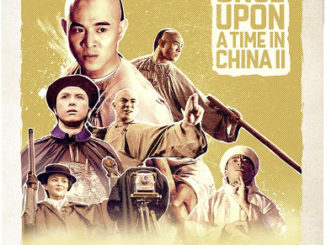
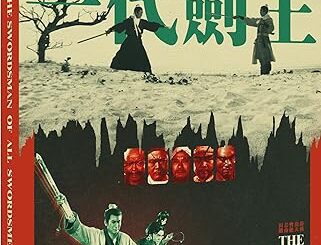
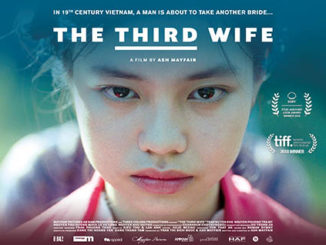
Be the first to comment